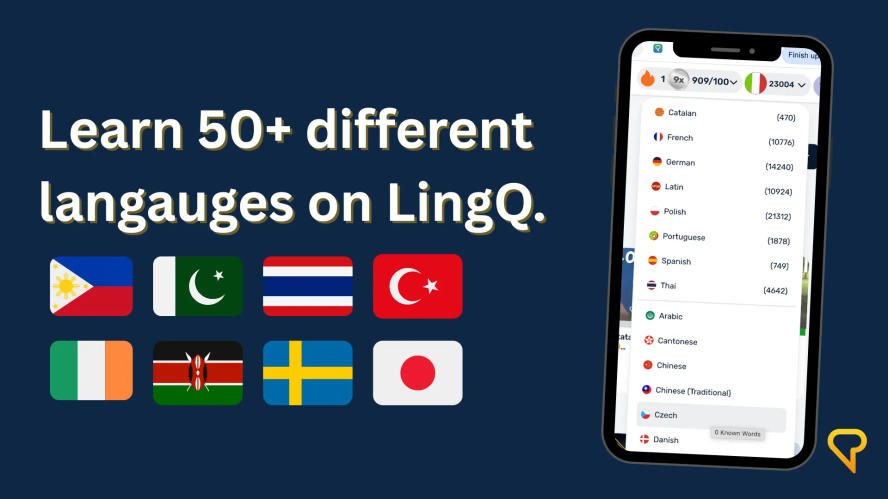TL;DR Summary
You don’t become a polyglot with tricks — you become one with the right mindset. Start by really learning one language well, embrace imperfection, and accept that some languages will get rusty. Motivation, curiosity, and enjoyment fuel the journey more than talent.
***
The other day, my wife and I were paired up with a couple at our golf club. They told us about their upcoming cycling trip through Catalonia in Spain. Naturally, I asked if they planned to learn Catalan or Spanish. Their answer? “We’ll just get by with English.”
This is a common answer. In big cities, hotels, or restaurants, English often works. But outside the tourist hubs? Not always. To me, learning even a little Catalan would make the experience far richer. This, in a sense, is the mentality of a polyglot—seeing language learning not as a burden, but as a source of fun, connection, and discovery.
The purpose of this post is to share what it takes to be a polyglot—not tricks or shortcuts, but the mindset, motivation, and acceptance of imperfection that make the journey rewarding.
1. Learn One Language First
The first step to becoming a polyglot isn’t learning five languages at once—it’s learning one. You can’t skip the experience of achieving fluency in one other language. Learn one language and learn it well. Discover what it feels like to think, communicate, and connect in a different tongue.
That was my path. I got interested in French, later had the chance to learn Mandarin, then Japanese, and so on. Each new language gave me confidence that I could do it again. The process became enjoyable, and I had enough confidence in myself to stay the course each time.
Once you succeed in one language, you not only realize that you can do it, but also that you enjoy the process. That success makes you want to repeat it again and again.
2. Accept Imperfection
Some people aim for perfection in one language. That’s great, but it’s not the polyglot mindset. A polyglot accepts that their French could always be better, or their Japanese has gaps. We make a choice: instead of endlessly polishing one language, we move on to discover a new one.
Along the way, languages interfere with each other. I’ve had Persian pop into my Russian conversations. That’s normal. Mistakes, imperfect pronunciation, and rusty skills in some languages are part of the deal. If you were to ask me to speak in Romanian or Greek right now, I probably wouldn’t be able to do it. And yet, I once had those languages at a level where I could travel and communicate easily.
Being a polyglot is accepting imperfection among your languages. If you have 20 pots on a stove, it’s very difficult to keep them all simmering without burning any one of them. The goal isn’t perfection—it’s exploration.
3. The Joy of Discovery
Each new language opens up a world of people, history, and culture. That’s what keeps me motivated, even after 20 languages. Right now, I’m deep into Arabic and Persian, but I’m also looking forward to exploring new languages. For example, LingQ now offers Turkish, Urdu, Thai, Tagalog, and more. I know that each one will take effort, but learning a language has become a source of pleasure.
For some people, the motivation might be showing off—adding another notch to the belt. I’m not criticizing learning a language to show off your prowess. However, I believe that, in the long run, curiosity and genuine interest are stronger fuel.
I’ve been learning Arabic and Persian for more than two years. If my goal were merely to say a couple phrases and show off, I would have run out of steam by now. I continue to study these languages because I continue to discover new things about the languages and their respective cultures.
Conclusion: The Polyglot Mindset
To become a polyglot, you don’t need perfection—you need motivation and curiosity. You learn languages one at a time, and each success gives you the confidence to try another. Along the way, some of your languages will get rusty, and that’s fine.
What matters is the willingness to accept interference, mistakes, and imperfection while continuing to explore new worlds through language. Being a polyglot isn’t about keeping every language at its sharpest. It’s about cultivating the mindset that values discovery, connection, and the lifelong joy of learning.
FAQs
1. Do you need a talent for languages to be a polyglot?
I don’t think so. You need curiosity and persistence. Motivation matters far more than talent.
2. Why do so many English speakers avoid learning other languages?
English is so widespread that many feel they can “get by” without learning. I call this the English language disease—but it’s the opposite of a polyglot mindset.
3. Should I master one language before moving on?
Not necessarily. Polyglots often move on once they’re comfortable, not perfect, in a language. But an aspiring polyglot should understand what it’s like to learn one language to a high level.
4. Won’t I forget the languages I don’t practice?
Yes, some will get rusty. But that’s part of being a polyglot. You can always refresh them later if needed.
5. How many languages do you need to know to be a polyglot?
There’s no fixed number, and you don’t need to be fluent in every language that you’ve studied.









